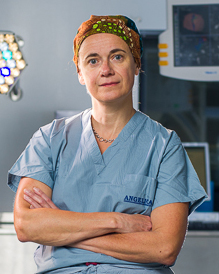
Alexandra Golby, MD
Dr. Golby is a Neurosurgeon and Haley Distinguished Chair in the Neurosciences at Brigham and Women’s Hospital in Boston. She is Professor of Neurosurgery and Professor of Radiology at Harvard Medical School. She is also Principal Investigator of the Golby Lab, a surgical brain mapping laboratory. Dr. Golby’s clinical focus is on brain surgery for patients with brain tumors and epilepsy, especially those lesions which are intimately associated with critical brain structures. Her translational research is focused on advanced imaging and image guidance to improve care for patients undergoing intracranial neurosurgery. She has developed numerous technologies to help guide presurgical planning and intraoperative decision-making. She works closely with scientists across disciplines including computer science, applied mathematics, MR and ultrasound physics, radiology, neuroscience, and biomedical engineering. She is very involved with mentoring young clinicians and scientists both locally and globally. Dr. Golby was recently a Fulbright Global Scholar pursuing work to foster interdisciplinary collaborations between technical experts and clinicians in host countries Rwanda and Morocco to develop innovative medical technology suited to local conditions.
Dr. Golby received her BA from Yale University and MD from Stanford University School of Medicine. She completed residency training in Neurosurgery at Brigham and Women’s Hospital.
The Golby Lab is a multidisciplinary team of investigators using advanced imaging, image analysis, and computational strategies to develop novel approaches to guide neurosurgery. Areas of interest include using functional MRI to map cortical organization and diffusion MRI to map white matter connections, intra-operative imaging, navigation and guidance, and image guided therapies for brain tumors. She is the co-director of AMIGO, the advanced multi-modality Image guided OR, an NIH-funded translational research operating suite where surgeons and interventionalists work with radiologists and technical experts to develop novel therapies to provide precise, minimally invasive, and effective treatments to patients. She leads the development of NousNav a low-cost open-source neuronavigation system for use in resource-limited settings.
1999; 2:215-221.
2005; 11(1):39-44.
1993; 43(9):1865-1865 .
1998.
2005; 26((Suppl1):S31).
2007.